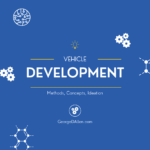The Concept of “Good Enough”

The Concept of "Good Enough"
In the world of engineering, the pursuit of perfection often meets the pragmatic reality of constraints. The concept of “Good Enough” serves as a guiding principle that engineers navigate as they design, innovate, and create. Balancing technical excellence with practical considerations, the “good enough” philosophy is a crucial aspect of responsible engineering. In this article, we delve into the intricacies of the “good enough” concept in engineering, exploring how it influences decisions, creativity, and the achievement of successful outcomes.
Defining "Good Enough"
Consequently, “Good enough” is a term that signifies reaching a satisfactory level of quality and functionality without necessarily striving for absolute perfection. It acknowledges that the pursuit of perfection can lead to diminishing returns, where the additional effort or resources invested may not significantly improve the final outcome.
As an example, this is a general reference to the Minimum System Requirements: https://www.lawinsider.com/dictionary/minimum-system-requirements#:~:text=Minimum%20System%20Requirements%20means%20a,(such%20as%20payment%20notifications)
Balancing Constraints and Objectives
Furthermore, engineering projects often operate within a web of constraints—budgets, timeframes, resources, and technical limitations. The “Good Enough” principle guides engineers in striking a balance between achieving technical excellence and meeting these constraints. It prompts engineers to make informed trade-offs that optimize solutions within the boundaries of reality.
Reference System Engineering Method: https://georgedallen.com/navigating-chaos-systems-engineering-in-vehicle-occupant-sensing/
Risk Management and Decision-Making
In addition, Risk is inherent in engineering projects. The “Good Enough” philosophy encourages engineers to assess risks realistically and make decisions that mitigate potential negative outcomes. While pursuing perfection might minimize risks, it could also lead to unnecessary delays and increased costs. Engineers assess the acceptable level of risk and make choices that maintain an optimal balance.
Resource Optimization and Efficiency
Therefore, the pursuit of perfection can lead to resource overutilization. The “Good Enough” philosophy prompts engineers to allocate resources efficiently, focusing efforts where they will yield the most significant impact. This approach ensures that resources are used judiciously to achieve the best possible result within practical limitations.
Iterative Improvement and Innovation
The “Good Enough” philosophy doesn’t negate the pursuit of improvement and innovation. It encourages engineers to deliver functional solutions while leaving room for future iterations and enhancements. Moreover, by releasing a “Good Enough” solution, engineers can gather real-world feedback, refine designs, and continually innovate to meet evolving needs.
User-Centered Design and Satisfaction
Designing solutions that are “Good Enough” places emphasis on meeting user needs and satisfaction. Rather than fixating solely on technical perfection, engineers ensure that their creations provide tangible benefits and meet user expectations. A user-centered approach acknowledges that meeting real-world requirements often takes precedence over theoretical ideals.
Ethical Considerations and Responsibility
The “Good Enough” principle aligns with ethical responsibility. Engineers have a duty to deliver solutions that are safe, reliable, and fit for purpose. The pursuit of perfection should not compromise the ethical obligations to users and stakeholders. Balancing technical quality with ethical standards ensures that the final product is not only functional but also morally sound.
Conclusion
Finally, in the ever-evolving landscape of engineering, the concept of “Good Enough” serves as a pragmatic compass that guides decisions and actions. Striking the right balance between technical excellence, constraints, and user satisfaction is essential for responsible engineering. By embracing the “Good Enough” philosophy, engineers can deliver solutions that are effective, efficient, and aligned with the real-world demands of a rapidly changing world.
About George D. Allen Consulting:
George D. Allen Consulting is a pioneering force in driving engineering excellence and innovation within the automotive industry. Led by George D. Allen, a seasoned engineering specialist with an illustrious background in occupant safety and systems development, the company is committed to revolutionizing engineering practices for businesses on the cusp of automotive technology. With a proven track record, tailored solutions, and an unwavering commitment to staying ahead of industry trends, George D. Allen Consulting partners with organizations to create a safer, smarter, and more innovative future. For more information, visit www.GeorgeDAllen.com.
Contact:
Website: www.GeorgeDAllen.com
Email: inquiry@GeorgeDAllen.com
Phone: 248-509-4188
Unlock your engineering potential today. Connect with us for a consultation.

